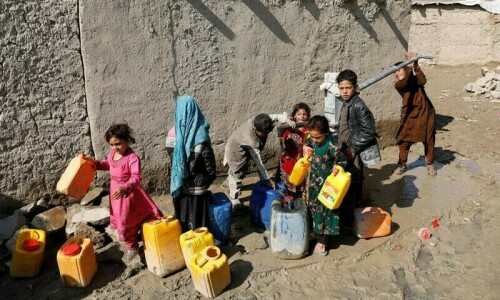KARACHI: Demanding enhanced taxation on tobacco that claims 200,000 lives every year in the country, experts on Tuesday pointed out that tobacco-related diseases and deaths cost Pakistan Rs615.07 billion every year, an amount which is five times higher than the overall tax revenue the government generates from the tobacco industry.
They told a press conference that higher taxes were known to be the most cost-effective tobacco control tool available to governments throughout the world and the same was needed to be enforced in Pakistan.
The event was organised by the Pakistan Chest Society (PCS) — a representative body of chest physicians — here at the press club.
“Medical science has proven that tobacco causes serious harm to human health. Over 90 per cent cases of lung cancer and 85 per cent cases of chronic obstructive lung disease are caused by smoking,” said Prof Javaid Khan, PCS-Sindh chapter president and senior professor at the Aga Khan University (AKU).
Citing studies conducted in Pakistan, he said that almost 50 per cent of all cancer cases in the country could be prevented if tobacco use was avoided.
Prof Sohail Akhter of Indus Hospital said that currently the average excise tax share on tobacco products in the country was 45 per cent of their retail price, which was much lower than the WHO recommendation for at least 70 per cent of the retail price.
Prof Faisal Faiyaz Zuberi of Ojha Institute of Chest Diseases said that despite evidence that higher tobacco taxation discouraged tobacco consumption, Pakistan’s tax policy was among the weakest action areas in the country’s fight against the menace.
“One explanation could be that the policymakers, who consider the tobacco industry a major contributor to government coffers, are reluctant to raise taxes fearing revenue loss,” he said, adding that it’s time for the government to consider the high cost Pakistan incurred in terms of mortality and morbidity caused by tobacco.
Dr Kamran Khan, general secretary of the PCS and senior chest physician at the JPMC, said the tobacco industry had ensured that tobacco products continued to remain inexpensive while keeping their profits, albeit, at the cost of public health.
Dr Qaisar Sajjad of the PMA talked about tobacco being used in different forms and products as well as the dangers of passive smoking.
“Tobacco being used in paan, naswar and gutka and betel nutsarethe leading cause of cancer in the oral cavity and the larynx (voice box) in Pakistan. Unfortunately, these harmful products are easily available everywhere and to everyone including children,” he said, demanding a ban on the import of betel nut.
Referring to the WHO, he said there was a misconception that Shisha was safe. In fact, he pointed out, it contained 40 per cent tobacco and puffing Shisha for an hour was like smoking 200 cigarettes.
Dr Sajjad also cited cases of two female patients who developed cancer of the larynx due to passive smoking. “We had to remove their voice boxes as their cancer had progressed. The father-in-law of one patient was a cigarette-smoker while the other had at least three male smokers in the family.”
Published in Dawn, June 1st, 2022















































